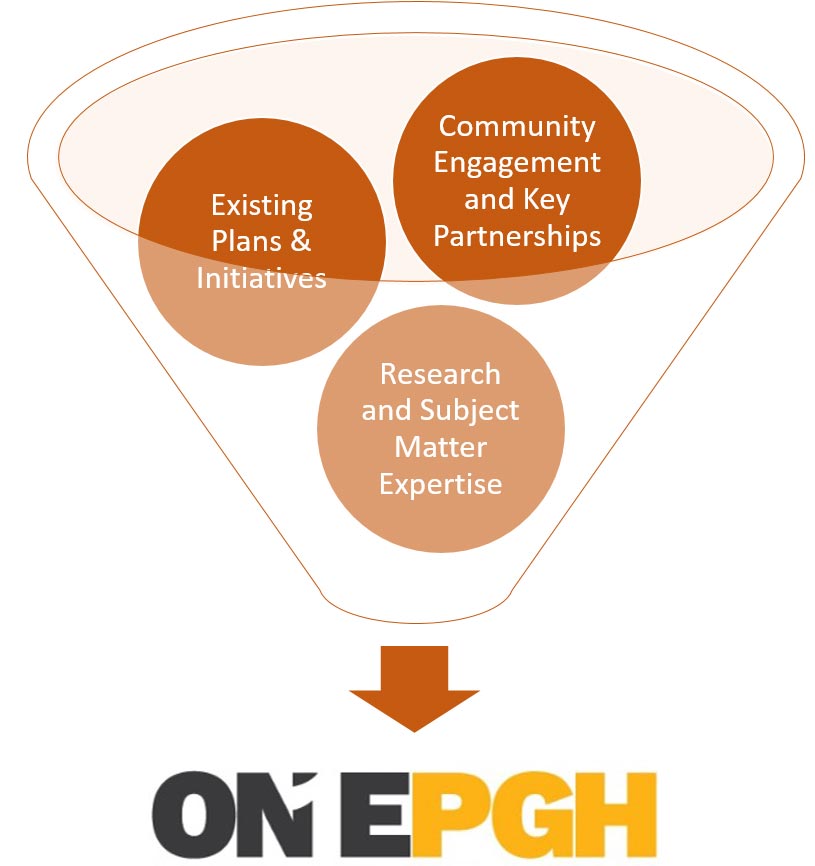

Read the full press release details here.
The City of Pittsburgh is committed to taking on our most significant challenges. As a follow up to the and the City and Heinz Endowments’ collaborative P4 Initiative, an Investment Prospectus was commissioned to create an action plan utilizing our P4 principles (people, planet, place, and performance) as the core foundation to address future challenges.
Since 2015, the City has assembled more than 2,000 Pittsburghers to identify the City’s shocks and stresses profile, as well as the most critical projects ready for implementation, with the intention to put existing plans and analyses into action. By 2030, we want to show measurable success in tackling our environmental stresses, maintaining cultural and natural assets, and eradicating hunger and homelessness. We envision safe and complete streets that don't just offer physical mobility but ensure social mobility and access to opportunities in each of our unique neighborhoods. By 2030, we envision our housing will be affordable, Pre-K will be available for all Pittsburghers, our stormwater will be an asset, and we will have a world-class water system.
How do we achieve this vision of Pittsburgh by 2030? We need the agility to work across sectors: public, private, nonprofit, and philanthropic, to create efficiencies and targeted outcomes by reducing fragmentation in the city. We need the resources to innovate, experiment and not fear failure, but use it as a tool to create better projects and programs. We need the reserves to rebound from the shocks and disasters that take us by surprise.
Throughout this process, Mayor Peduto convened working groups to take existing plans and analyses developed over the past five years, and identify and associate costs with those transformational projects that will inspire the city to thrive by 2030. The Mayor will use this project list, the ‘Investment Prospectus,’ to raise the capital needed to ameliorate the chronic stresses that currently impact resident well-being.

Acute shocks are sudden, large-scale disasters that disrupt city services and threaten residents.
Chronic stresses are long-term, slow-burning issues that overwhelm the capacity of city resources and erode resident well- being. Pittsburgh is dealing with significant chronic stresses that, if left unchecked, risk the ability to escalate into a shock.
The Investment Prospectus is a list of initiatives designed to address the City’s major chronic stresses. While each initiative addresses at least one stressor, the overall intention of the Investment Prospectus is to address two of the most pervasive stressors: racial and economic inequity and fragmentation.


Fragmentation between sectors challenges local governance and the ability to address endemic stresses facing Pittsburghers. The City of Pittsburgh alone includes 90 distinct neighborhoods and is home to over 3,100 non-profit organizations, many with overlapping missions that put them in competition for the same resources. By addressing fragmentation through intentional cross-sector collaboration and investment, the City sees the ONEPGH Investment Prospectus as a catalyst for cooperation to tackle our challenges and ensure that necessary services and opportunities are reaching our residents efficiently and effectively.
412 Food Rescue
@Action Housing
African American Chamber of Commerce of Western Pennsylvania
ALEM Consulting, LLC
Allegheny Conference on Community Development
Allegheny County
Allegheny County Council
Allegheny County Department of Economic Development
Allegheny County Department of Human Services
Allegheny County Health Department
Allegheny County Jail
Allegheny County Parks
Allegheny County Sanitary Authority
Allegheny Regional Asset District
The Andy Warhol Museum
BikePGH
BNY Mellon
BOOM Concepts
The Buhl Foundation
Carnegie Mellon University
Children’s Museum
City of Pittsburgh Art Commission
City of Pittsburgh City Council
City of Pittsburgh Commission on Human Relations
City of Pittsburgh Department of City Planning
City of Pittsburgh Department of Emergency Management and Homeland Security
City of Pittsburgh Department of Finance
City of Pittsburgh Department of Innovation and Performance
City of Pittsburgh Department of Mobility and Infrastructure
City of Pittsburgh Department of Public Works
City of Pittsburgh Historic Review Commission
City of Pittsburgh Office of the Mayor
CUNY Institute for State and Local Governance
The Climate Reality Project
Communitopia
Community Human Services
Conservation Consultants, Inc.
Consumer Health Coalition
Council of Three Rivers American Indian Center
Cultural Trust
Duquesne Light Company
Duquesne University
Early Learning Investment Coalition
Economic Development South
Eden Hall Foundation
Energy Innovation Center Institute
Evolve EA
Forbes Fund
Gateway Financial
Giant Eagle
The Grable Foundation
Greater Pittsburgh Community Food Bank
Green Building Alliance
Habitat for Humanity
Harvard University
Hazelwood Initiative
Healthy Ride
Highmark
The Hillman Foundation
Hilltop Alliance
Homewood Children's Village
Housing Authority of the City of Pittsburgh
Jewish Community Center
KBK Enterprise
Kelly Strayhorn Theatre
Kingsley Association
LISC
Manchester Bidwell Corporation
Mayor’s Fund to Advance New York City
Nascent Holdings Group
National Energy Technology Laboratory
National Resources Defense Council
Neighborhood Allies
NeighborWorks
Open Door
Partner 4 Work
PennDOT
Pennsylvania Environmental Council
Pennsylvania Historical & Museum Commission
Pennsylvania Resources Council
Peoples Natural Gas
Perry Hilltop, Fineview Citizens Council
Pittsburgh Community Reinvestment Group
The Pittsburgh Foundation
Pittsburgh History and Landmarks Foundation
Pittsburgh Mercy's Operation Safety Net
Pittsburgh Parking Authority
Pittsburgh Parks Conservancy
Pittsburgh Promise
Pittsburgh Public Schools
Pittsburgh Technology Council
Pittsburgh Water and Sewer Authority
PNC
Policy Link
Port Authority of Allegheny County
Preservation Pittsburgh
Project Destiny
Ralph A. Falbo Inc.
Rebuilding Together Pittsburgh
Reed Smith
The Richard King Mellon Foundation
Riverside Center for Innovation
Robin's Nest Early Learning Center
Service Employees International Union
State of Pennsylvania, House of Representatives (Gainey, Wheatley
State of Pennsylvania, Office of the Governor
Sustainable Pittsburgh- Power of 32
The Brookings Institution
The Door Campaign
The Heinz Endowments
The Hillman Foundation
The RAND Corporation
Tree Pittsburgh
Trek Development
Trying Together
United States Department of Homeland Security
University of Pittsburgh
UPMC
Urban Innovation 21
UrbanKind Institute
Urban League of Greater Pittsburgh
Urban Redevelopment Authority of Pittsburgh
Venture Outdoors
Vision Zero
Women for a Healthy Environment
World Economic Forum
WQED
Youth Places